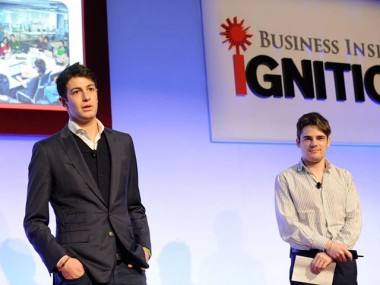Oscar Insurance Founders Bring a Techie Take to Obamacare (Interview)

Image copyright Michael Seto/Business Insider Oscar co-founders Josh Kushner and Mario Schlosser
The technology industry likes to think of itself as working on legitimately hard problems with the potential for massive positive impact on the world. Sometimes that’s true, other times … it’s hard to make the case.
But when startups bring tech smarts and design into large, hidebound industries, the good fight may actually be getting fought. The latest such effort is Oscar, a new healthcare startup. It offers its own health insurance.
Oscar is the only new commercial health insurance provider in New York State in the last 15 years.
The Oscar service includes three free physician visits, unlimited calls to a doctor at any time of the day or night, and unlimited generic drugs. Its least-expensive plan is priced near the bottom of the market — currently the third cheapest of 17 options on the new Obamacare health insurance exchange in New York.
To be clear, Oscar has not even begun to offer its service yet (January 1 is the kickoff). It’s getting a steady stream of press due in part to a famous co-founder, but that means little for its long-term prospects.
Add the uncharted territory of health insurance to the gazillions of reasons that technology startups could fail. And the Affordable Care Act is not exactly a beacon of stability.
But here’s the Oscar pitch, honed over the last two years — which has raised $40 million from investors including General Catalyst, Khosla Ventures and Founders Fund, and is exceedingly well-timed to the launch of Obamacare — straight from the mouths of co-founders Josh Kushner and Mario Schlosser via a recent phone interview.
Health insurance in the United States is traditionally sold to employers. That misaligns incentives around care for actual people, and creates data gaps between something happening, the availability of a provider and the billing process.
By bridging the healthcare process together, Oscar thinks it can be more effective and cheaper. And, not a pain in the ass for all involved.
“We actually can make an impact because we control the relationship,” said Kushner, a real estate scion who invested in Instagram via his VC firm Thrive Capital and already has his own Wikipedia page. He and Schlosser previously co-founded the Brazilian social gaming company Vostu. “We were fortunate enough to dig into this and learn as much as we could before everything went into action.”
“There’s just a lot of startups out there that are incremental,” Kushner adds. “There’s so big many problems to solve, so why would you do anything else?”
“Originally Oscar was not contingent on the ACA,” said Schlosser. “But along the way we realized, wow, we can do so much more than be a pretty user interface.”
The company spent two years getting certified in New York, which required something like 9,000 pages worth of filings, contracts and descriptions of how the business works, he said.
“It’s not your normal bullshit venture capital business model pitch with a hockey stick graph,” Schlosser joked.
Further, the company needed so much capital because it had to set aside an ever-growing amount in reserve due to regulatory mandates ($1 in reserves for every $8 in premiums). Today, $29 million of the funding is held in reserve.
“If you look really closely you realize there’s a lot of data points to grab,” said Schlosser. “Normally, when you walk in to the doctor’s office, you will get a claim from that doctor probably four weeks later.” By contrast, Oscar registers the beginning of care in its system when the patient initiates a phone call or appointment.
Or another example: Telemedicine. With traditional health insurance relationships, if a patient gets a migraine at four in the morning on a Saturday, often the best available option for care is an emergency room. That’s overkill, and expensive and inefficient for everyone involved. Better to send the patient to a doctor via telephone who can pull up her medical history and send a report to her regular provider.
“If you do basic research, it’s a cost reduction to offer telemedicine,” Schlosser said. “It’s low-hanging fruit.”
Those insights come from a team of 42 people composed of techies like Foursquare co-founder Naveen Selvadurai and healthcare experts like Aran Ron, a doctor and long-time health insurance executive who was chief medical officer at Emblem in New York.
“Whenever we do something, we do it in a sound actuarial way,” Schlosser said. “Our insurance premiums were not just cooked up by our own spreadsheets.”
So what happens if Obamacare gets sacrificed amid the ongoing political meltdown? Would that have an adverse impact on Oscar? Kushner’s answer isn’t the most convincing, but he claims he’s not worried.
“I don’t think we’re the best to speak to that, but I would say no; we’re already a business,” he said.
The challenge now is getting people to sign up for Oscar. That hasn’t been helped by the repeated downtime the New York exchange had in its first week.
Kushner and Schlosser said they plan to focus on the New York market for the foreseeable future. “There are about a million people in a 50-mile radius for whom it would be a good idea to sign up for this,” Schlosser said.
“We’re treating this like a political campaign, trying to get the word out,” Kushner said. “We’re on the streets. We have a ground game.”









